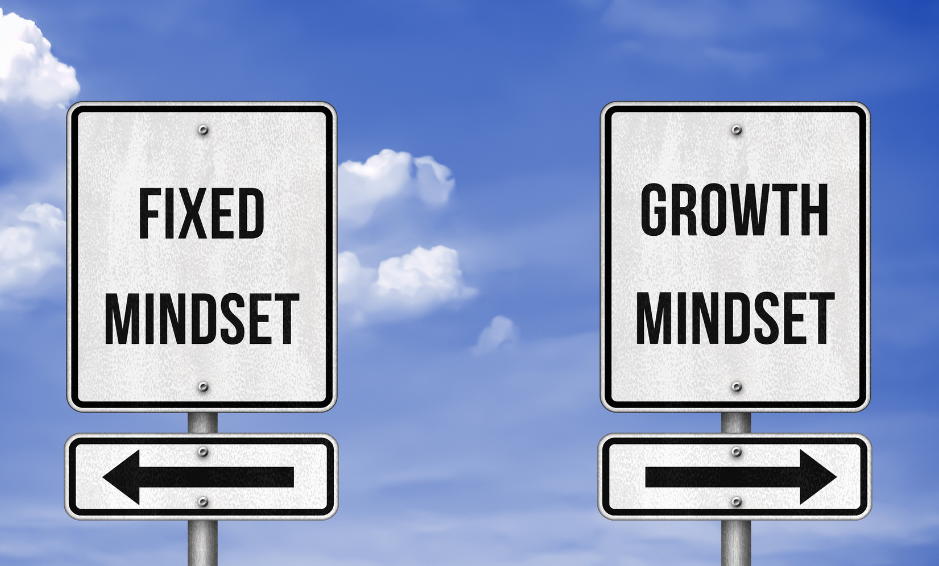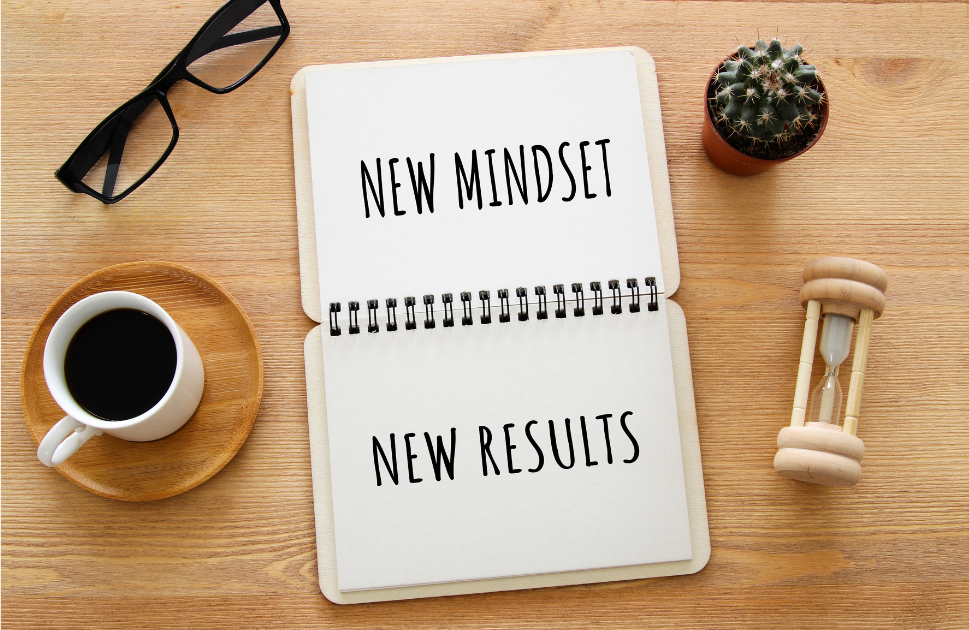Have you ever caught yourself in a loop of negative thoughts, feeling like you’re in a mental prison with no way of escape?
If so, you’re not alone. We’ve all been there, wrestling with self-doubt and the relentless chatter of our inner critic.
But the beauty lies in realizing that a shift in perspective can change the entire trajectory of your life.
In this blog post, we’ll explore how to change your mindset, the power of your thoughts and beliefs, and how a mindset shift can help you realize your full potential and achieve greater success and fulfillment in all aspects of life.
Whether you aspire to reach new levels in your career, improve relationships, or enhance your overall well-being, changing your mindset is the key that can open doors to endless possibilities.
Let’s dive in.
What is Mindset?

Mindset is the collection of thoughts, beliefs, attitudes, and perceptions that shape your understanding of yourself, others, and the world around you. It’s the lens through which you interpret and make sense of your experiences, guiding your actions, decisions, and responses.
Your mindset influences how you view challenges, handle setbacks, approach opportunities, and pursue your goals. It is the underlying framework that determines your level of motivation, resilience, and ability to grow and adapt.
Mindset is not fixed or predetermined but can be consciously shaped and transformed through self-reflection, learning, and intentional practices.
Growth Mindset vs. Fixed Mindset

At its core, mindset can be categorized into two main types: a fixed mindset and a growth mindset—the difference lies in how you perceive your abilities and approach challenges.
A fixed mindset is characterized by the belief that intelligence, talent, and abilities are fixed traits that cannot be significantly developed or changed. Those with a fixed mindset avoid challenges, fearing failure will confirm their limitations.
They may believe their qualities are predetermined and cannot be improved through effort or learning. As a result, individuals with a fixed mindset often seek validation and avoid situations where they might feel inadequate.
In contrast, a growth mindset is characterized by the belief that abilities and intelligence can be developed through dedication, effort, and continuous learning. Those with a growth mindset embrace challenges, seeing them as opportunities for growth and learning.
They understand that setbacks and failures are part of the learning process and do not define their worth or capabilities. Those with a growth mindset are more likely to persist in the face of obstacles, view mistakes as valuable lessons, and actively seek opportunities for self-improvement.
They have a positive attitude toward personal development and believe their potential is not fixed but can be continually expanded with effort and practice.
The impact of mindset on personal development and achievement is significant. Those with a growth mindset tend to outperform individuals with a fixed mindset in many areas of life.
By embracing a growth mindset, you can increase your motivation to learn, take on challenges, and make the necessary effort to improve your skills. You’d be able to see setbacks as temporary and solvable, viewing them as opportunities for growth and self-reflection. As a result of adopting a growth mindset, you become more resilient, adaptable, and open to new possibilities.
Understanding the distinction between a growth mindset and a fixed mindset allows you to cultivate self-awareness and actively work toward developing a growth-oriented perspective. You can transform your mindset and live more fully through deliberate practice, embracing challenges, and nurturing a belief in your capacity for growth.
Benefits of Maintaining a Growth Mindset

Maintaining a growth mindset is a powerful tool that can profoundly impact your well-being, relationships, and overall success in life. Below is a detailed list of the benefits of cultivating and maintaining a positive mindset that you should keep in mind as you navigate your personal development journey.
Increased Resilience
You gain the ability to bounce back from setbacks and challenges more effectively. It fosters a belief in your capability to overcome obstacles, adapt to change, and find solutions.
With a positive mindset, you develop resilience, which is crucial for navigating life’s ups and downs.
Improved Mental and Emotional Well-Being
Better mental and emotional well-being. A growth mindset reduces stress, anxiety, and negative thinking patterns, leading to improved mental health.
Positivity nurtures a sense of optimism, contentment, and gratitude, contributing to overall happiness and life satisfaction.
Enhanced Problem-Solving Skills
A growth mindset encourages you to approach problems and challenges with a solution-oriented mentality. It fuels creativity, critical thinking, and innovative problem-solving skills.
With a growth mindset, you’re more likely to find alternative approaches, see opportunities among difficulties, and generate constructive solutions.
Better Physical Health
Studies have shown that a growth mindset is associated with better physical health outcomes.
Positive thinking and optimism have been linked to reduced risk of cardiovascular diseases, improved immune system functioning, lower levels of inflammation, and overall better health behaviors such as exercise and healthy eating.
Stronger Relationships
A growth mindset fosters healthier and more fulfilling relationships. Positive people are more approachable, supportive, and empathetic, which enhances their interpersonal connections.
They tend to attract amiable people and create a positive social environment, contributing to stronger and more meaningful relationships.
Increased Motivation and Productivity
Maintaining a growth mindset fuels motivation and productivity. Optimistic individuals are more likely to set goals, stay focused, and take proactive steps toward achieving their aspirations.
They approach tasks enthusiastically, enjoy the process, and feel more fulfilled by their accomplishments.
Better Decision-Making
Positivity and a growth mindset contribute to better decision-making. Maintaining a positive attitude makes you more open to diverse perspectives, willing to take calculated risks, and can better weigh options objectively.
This leads to more informed and effective decision-making, both personally and professionally.
Greater Opportunities for Success
A growth mindset produces a mentality of abundance and possibilities. Optimistic people believe in their capabilities and are more likely to seize opportunities and take action toward achieving their goals.
They are not held back by self-doubt or fear of failure, allowing them to embrace growth and success.
Improved Leadership Skills
A growth mindset is an essential trait for effective leadership. Positive leaders inspire and motivate others, foster a supportive and uplifting work environment, and encourage team growth and development.
They are more resilient in the face of challenges and can lead with optimism and confidence.
Overall Happiness and Life Satisfaction
The most significant benefit of maintaining a growth mindset is the overall happiness and life satisfaction it brings.
It provides an opportunity to appreciate the present moment, find joy in everyday experiences, and maintain a positive outlook on the future. While also contributing to an overall sense of fulfillment and contentment in life.
How to Change Your Mindset?

Avoiding negative mindsets can be challenging, especially when facing adversity, setbacks, or overwhelming circumstances. It’s important to realize, however, that you’re human, and there will be moments when you allow negativity or pessimism to get the best of you.
However, with conscious effort and practice, changing your mindset and cultivating a more positive outlook is possible. Here are some strategies to help transform your mindset and better navigate challenging times:
Develop Self-Awareness
Begin by becoming aware of your thoughts and emotions. Take notice when negative self-talk or limiting beliefs come up.
If you recognize these patterns, you can consciously shift your focus and redirect your thoughts toward more positive and empowering perspectives.
Practice Gratitude
Cultivating a gratitude practice can transform your mindset. Take time each day to reflect on what you are grateful for, no matter how small.
This helps shift your focus toward the positive aspects of your life and fosters a sense of appreciation.
Reframe Challenges
Instead of viewing challenges as insurmountable obstacles, reframe them as opportunities for growth and learning. Look for lessons and silver linings in difficult situations.
This shift in perspective can empower you to approach challenges with a more positive and solution-oriented mindset.
Surround Yourself with Positive People
Surround yourself with supportive and positive influences. Seek out relationships and environments that uplift and inspire you.
Engage in activities that bring you joy and promote positivity, such as spending time in nature, practicing hobbies, or connecting with loved ones.
Practice Self-Compassion
During challenging times, being kind and compassionate toward yourself is essential. Treat yourself with the same care and understanding you’d offer a close friend.
Practice self-care, prioritize your well-being, and allow yourself to rest and recharge when needed.
Set Realistic Goals
Break down big goals into smaller, achievable steps. Celebrate each milestone along the way, which boosts confidence and reinforces a growth mindset.
By focusing on progress and growth, you can maintain motivation and a sense of accomplishment.
Challenge Negative Thoughts
Challenge negative thoughts and replace them with positive affirmations. Whenever negative self-talk arises, consciously counter it with positive and empowering statements.
Over time, this rewires your thinking patterns and helps you maintain a more positive attitude.
Practice Mindfulness and Meditation
Engage in mindfulness and meditation to cultivate present-moment awareness and calm the mind.
These practices help reduce stress, increase self-awareness, and create a space for positive thoughts and emotions to emerge.
Seek Support
Contact a trusted friend, family member, coach, or therapist when you need support.
Talking about your challenges and feelings with others can provide perspective, encouragement, and guidance, helping you maintain a more positive outlook.
Embrace Self-Development
Engage in personal development activities such as reading inspiring books, listening to motivational podcasts, or attending workshops.
These resources can provide valuable insights, tools, and techniques to foster personal growth.
Changing your mindset is a gradual process that requires patience, persistence, and self-compassion. Incorporating these strategies into your daily life will support you in steadily shifting your mindset and cultivating a more positive and empowering outlook.
Final Thoughts

While it may be hard to maintain a growth mindset consistently, it is essential to remember that shifting your perspective is possible with conscious effort and practice.
Developing self-awareness, practicing gratitude, reframing challenges, and surrounding yourself with positivity can support you in gradually changing your mindset and embracing a more optimistic and empowered outlook.
Being intentional about changing your mindset will offer the benefits of increased resilience, improved well-being, enhanced problem-solving skills, stronger relationships, and more significant opportunities for success. You can shape your thoughts, beliefs, and perspectives and, ultimately, create the life you desire.





